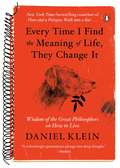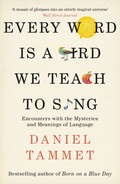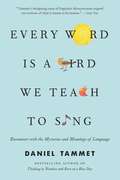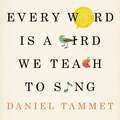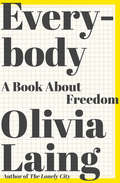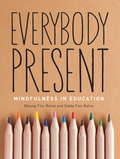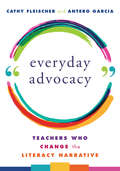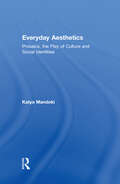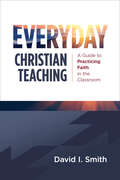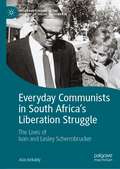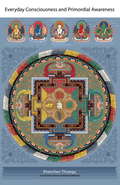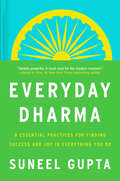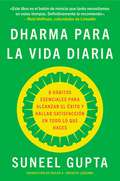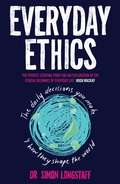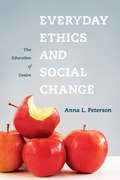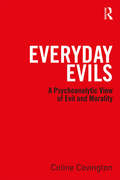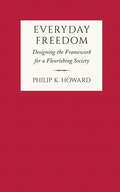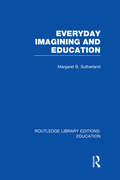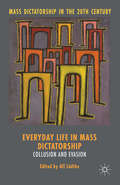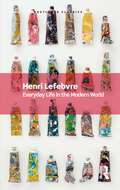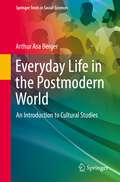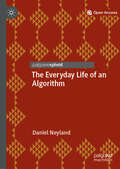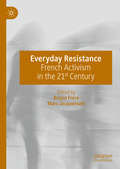- Table View
- List View
Every Time I Find the Meaning of Life, They Change It
by Daniel KleinA humorous and philosophical trip through life, from the New York Times-bestselling coauthor of Plato and a Platypus Walk into a Bar . . . Daniel Klein's fans have fallen in love with the warm, humorous, and thoughtful way he shows how philosophy resonates in everyday life. Readers of his popular books Plato and a Platypus Walk into a Bar . . . and Travels with Epicurus come for enlightenment and stay for the entertainment.As a young college student studying philosophy, Klein filled a notebook with short quotes from the world's greatest thinkers, hoping to find some guidance on how to live the best life he could. Now, from the vantage point of his eighth decade, Klein revisits the wisdom he relished in his youth with this collection of philosophical gems, adding new ones that strike a chord with him at the end of his life. From Epicurus to Emerson and Camus to the theologian Reinhold Niebuhr--whose words provided the title of this book--each pithy extract is annotated with Klein's inimitable charm and insights. In these pages, our favorite jokester-philosopher tackles life's biggest questions, leaving us chuckling and enlightened.
Every Word is a Bird We Teach to Sing: Encounters with the Mysteries & Meanings of Language
by Daniel Tammet'Full of charm and fascination' The Bookseller'Would dazzle any storyteller in love with words and their deepest meanings' Amy Tan, author of Joy Luck Club'A generous book and a beguiling read' Rebecca Gowers* * * * * *From the bestselling author of Born on a Blue Day and Thinking in Numbers, a delightful and eclectic exploration of language, and what it can teach us about ourselves and our lives.Why is the name 'Cleopatra' not allowed in Iceland? Why do clocks 'talk' to the Nahua people of Mexico? And if we are what we eat, are we also what we say? These are just some of the questions Daniel Tammet answers in Every Word is a Bird We Teach to Sing, a mesmerising new collection of essays investigating the intricacies and profound power of human language. Tammet goes back in time to explore the numeric language of his autistic childhood; he looks at the music and patterns that words make, and how languages evolve and are translated. He meets one of the world's most accomplished lip readers in Canada, learns how endangered languages like Manx are being revived and corresponds with native speakers of Esperanto in their mother tongue. He studies the grammar of the telephone, contemplates the significance of disappearing dialects, and also asks: will chatbots ever manage to convince us that they are human?From the art of translation to the lyricism of sign language, Every Word is a Bird We Teach to Sing is a fascinating journey through the world of words, letters, stories and meanings, and an extraordinary testament to the stunning range of Tammet's literary and polyglot talents.
Every Word Is a Bird We Teach to Sing: Encounters with the Mysteries and Meanings of Language
by Daniel TammetA mind-expanding, deeply humane tour of language by the bestselling author of Born on a Blue Day and Thinking in Numbers.Is vocabulary destiny? Why do clocks "talk" to the Nahua people of Mexico? Will A.I. researchers ever produce true human-machine dialogue? In this mesmerizing collection of essays, Daniel Tammet answers these and many other questions about the intricacy and profound power of language. In Every Word Is a Bird We Teach to Sing, Tammet goes back in time to London to explore the numeric language of his autistic childhood; in Iceland, he learns why the name Blær became a court case; in Canada, he meets one of the world's most accomplished lip readers. He chats with chatbots; contrives an "e"-less essay on lipograms; studies the grammar of the telephone; contemplates the significance of disappearing dialects; and corresponds with native Esperanto speakers - in their mother tongue. A joyous romp through the world of words, letters, stories, and meanings, Every Word Is a Bird We Teach to Sing explores the way communication shapes reality. From the art of translation to the lyricism of sign language, these essays display the stunning range of Tammet's literary and polyglot talents.
Every Word is a Bird We Teach to Sing: Encounters with the Mysteries & Meanings of Language
by Daniel Tammet'Full of charm and fascination . . . a veritable verbal treasure house' -The BooksellerA mind-expanding, deeply humane tour of language(s) - and those who speak, study, and invent them - by the bestselling author of Born on a Blue Day and Thinking in Numbers.Is vocabulary destiny? Why do clocks 'talk' to the Nahua people of Mexico? Will A.I. researchers ever produce true human-machine dialogue? In this mesmerizing collection of essays, Daniel Tammet answers these and many other questions about the intricacy and profound power of language. In Every Word Is a Bird We Teach to Sing, Tammet goes back in time to explore the numeric language of his autistic childhood; in Iceland, he learns why the name Blær became a court case; in Canada, he meets one of the world's most accomplished lip readers. He chats with chatbots; contrives an 'e'-less essay on lipograms; studies the grammar of the telephone; contemplates the significance of disappearing dialects; and corresponds with native Esperanto speakers - in their mother tongue. A joyous romp through the world of words, letters, stories, and meanings, Every Word Is a Bird We Teach to Sing explores the way communication shapes reality. From the art of translation to the lyricism of sign language, these essays display the stunning range of Tammet's literary and polyglot talents.(P)2017 Hodder & Stoughton
Everybody: A Book About Freedom
by Olivia Laing"Astute and consistently surprising critic" (NPR) Olivia Laing investigates the body and its discontents through the great freedom movements of the twentieth century. The body is a source of pleasure and of pain, at once hopelessly vulnerable and radiant with power. In her ambitious, brilliant sixth book, Olivia Laing charts an electrifying course through the long struggle for bodily freedom, using the life of the renegade psychoanalyst Wilhelm Reich to explore gay rights and sexual liberation, feminism, and the civil rights movement. Drawing on her own experiences in protest and alternative medicine, and traveling from Weimar Berlin to the prisons of McCarthy-era America, Laing grapples with some of the most significant and complicated figures of the past century—among them Nina Simone, Christopher Isherwood, Andrea Dworkin, Sigmund Freud, Susan Sontag, and Malcolm X. Despite its many burdens, the body remains a source of power, even in an era as technologized and automated as our own. Arriving at a moment in which basic bodily rights are once again imperiled, Everybody is an investigation into the forces arranged against freedom and a celebration of how ordinary human bodies can resist oppression and reshape the world.
Everybody Present
by Nikolaj Flor Rotne Didde Flor RotneEverybody Present seeks to create a new kind of culture in our schools: one that counters stress and facilitates learning. It reframes the student-teacher relationship, showing teachers how to supplant antagonism and foster strong relationships by planting seeds of mindfulness in their students and encouraging them to embark on a mindfulness practice of their own.Illustrating the transformative effects of mindfulness on educators, students, and their classrooms, Everybody Present shows how mindfulness helps to strengthen inner peace and prevent stress, foster contagious joy and an ethic of altruism, improve understanding between student and teacher, and fortify competence in educational relations.A working manual addressed to everyone in the educational universe, Everybody Present presents real-world applications grounded in solid research. Stories, exercises, and case studies demonstrate the effectiveness of mindful practices across all areas of education.Everybody Present is intended to contribute to the creation of a culture throughout the educational system writ large, working against stress and victim mentality to set in motion a revolution of silence, allowing each individual the experience of inter-being, inner calm, and joy. By exploring the challenges of teaching, Everybody Present will help all educators transform feelings of inadequacy into experiences of abundance.
Everyday Advocacy: Teachers Who Change The Literacy Narrative
by Cathy Fleischer Antero GarciaWhat counts as professionalism for teachers today? Once, teachers who knew their content area and knew how to teach it were respected as professionals. Now there is an additional type of competency required: in addition to content and pedagogical knowledge, educators need advocacy skills. In this groundbreaking collection, literacy educators describe how they are redefining what it means to be a teaching professional. Teachers share how they are trying to change the conversation surrounding literacy and literacy instruction by explaining to colleagues, administrators, parents, and community members why they teach in particular research-based ways, so often contradicted by mandated curricula and standardized assessments. Teacher educators also share how they are introducing an advocacy approach to preservice and practicing teachers, helping prepare teachers for this new professionalism. Both groups practice what the authors call “everyday advocacy”: the day-to-day actions teachers are taking to change the public narrative surrounding schools, teachers, and learning.
Everyday Aesthetics: Prosaics, the Play of Culture and Social Identities
by Katya MandokiKatya Mandoki advances in this book the thesis that it is not only possible but crucial to open up the field of aesthetics (traditionally confined to the study of art and beauty) toward the richness and complexity of everyday life. She argues that in every process of communication, whether face to face or through the media, fashion, and political propaganda, there is always an excess beyond the informative and functional value of a message. This excess is the aesthetic. Following Huizinga's view of play as an ingredient of any social environment, Mandoki explores how various cultural practices are in fact forms of playing since, for the author, aesthetics and play are Siamese twins. One of the unique contributions of this book is the elaboration and application of a semiotic model for the simultaneous analysis of social interactions in the four registers, namely visual, auditory, verbal and body language, to detect the aesthetic strategies deployed in specific situations. She argues that since the presentation of the self is targeted towards participants' sensibilities, aesthetics plays a key role in these modes of exchange. Consequently, the author updates important debates in this field to clear the way for a socio-aesthetic inquiry through contexts such as the family, school, medical, artistic or religious traditions from which social identities emerge.
Everyday Christian Teaching: A Guide to Practicing Faith in the Classroom
by David I. SmithDiscover how ordinary moments in the school year can become occasions for making profound connections between faith and pedagogy. In this encouraging and practical book, education expert David I. Smith invites Christian educators on a journey through the school year that will deepen their capacity to make thoughtful connections between their faith and their pedagogy. Mirroring the rhythms of an academic year, the book embraces and explores the mundane moments that all teachers experience every semester. Starting the course. Setting some norms for interaction. Choosing how to frame the material. Assigning tasks. Repeating things. Pausing. Bringing things to a close. The topics are deliberately ordinary because, as Smith demonstrates, the shape of one&’s teaching is mainly built from the unspectacular choices and actions that gradually shape the texture of life in the classroom. If educators want to think well about Christian faith and teaching and act well in the classroom, they need to learn to reflect well on those ordinary steps in the journey. Everyday Christian Teaching builds on Smith&’s previous book On Christian Teaching: Practicing Faith in the Classroom, where he made a persuasive case for connecting faith and pedagogy. The new book aims to put this idea into practice, as Smith explains in the introduction: &“Suppose we want to get better at thinking about faith and teaching together. What then? What does the road look like, and how do we walk it wisely? If we&’d like to be a pilgrim, how do we make progress?&” Taking up such questions with wisdom and empathy, Everyday Christian Teaching helps educators develop faith-informed insights and life-giving practices that can transform their teaching over the course of time.
Everyday Communists in South Africa’s Liberation Struggle: The Lives of Ivan and Lesley Schermbrucker (Palgrave Studies in the History of Social Movements)
by Alan KirkaldyThis book explores the role of social movements in the Southern African liberation struggle, through the lens of two ‘everyday communists’. Focusing on the Communist Party of South Africa (CPSA), the author explores the lives of Ivan and Lesley Schermbrucker, whose contribution to the party was more clandestine than that of leaders such as Bram Fischer and Joe Slovo. They represent how ‘ordinary’ people could play significant roles based on stances more rooted in common decency and morality than in Marxist theory. The book also sheds light on the interplay between transnational and national tendencies during the liberation movement, particularly between the 1940s and the 1960s. The Schermbruckers changed their views in response to the shifting national and international political landscape, the rise of Stalinism, and the flight of South African activists into exile from the 1960s. Both fluent in African languages, they were able to create relationships of trust with African members of the CPSA. Examining tensions and conflicts during the liberation struggle, this book provides fresh insights into ‘underground’ activism.
Everyday Consciousness and Primordial Awareness
by Khenchen Thrangu RinpocheTransformation of five afflictions into buddha wisdoms
Everyday Dharma: 8 Essential Practices for Finding Success and Joy in Everything You Do
by Suneel GuptaFind your dharma—your inner calling—and learn to integrate ambition, work, and wellbeing to create a balanced, joyous life with this practical, life-changing guide from the beloved speaker, bestselling author, and co-founder of the Gross National Happiness Center. We’ve been conditioned, from an early age, to believe that one day we’ll reach a moment of “arrival.” But no matter how much we achieve or acquire we still don’t feel as satisfied or as fulfilled as we thought we would be. Exhausted, we become burned out and cynical, questioning the purpose of it all.An expert on happiness and work, Suneel Gupta argues that for too long society has been fixated on the Future of Work and ignored the Future of Worth. We’ve compartmentalized work and well-being and ignored the fact that both are essential for sustained success. We’ve assumed that outer success leads to inner well-being–despite history showing us that this has never been the case.In Everyday Dharma, Suneel helps us break this negative cycle. A captivating storyteller, he weaves personal stories, history, science, Eastern philosophy, and Western modalities in this engaging, enlightening, and prescriptive book. He begins by helping us identify our dharma, the essence of who we are. When you’re in your Dharma, you feel confident, creative, and caring, with a sense of purpose, and that shines through your life and work.Everyday Dharma provides an accessible three-step approach to discovering, understanding, and living your “sacred calling.” At its center are self-assessments to help you identify your passions and powerful rituals for building new habits—ancient practices supported by science and found in diverse cultural sources, including Toni Morrison’s novels, Jimi Hendrix’s lyrics, and Frida Kahlo’s paintings, and used by the likes of Nelson Mandela, Dr. Martin Luther King, and Mahatma Gandhi.Finding your dharma empowers you to let go of anxiety, follow your wildest ambitions, produce your life’s work, and experience true joy.
Everyday Dharma \ Dharma para la vida diaria (Spanish edition): 8 hábitos esenciales para alcanzar el éxito y hallar satisfacción en todo lo que haces
by Suneel GuptaEncuentra tu dharma —tu llamado interior— y aprende a integrar ambición, trabajo y bienestar para crear una vida equilibrada y dichosa con esta guía práctica del reconocido conferencista, autor bestseller y cofundador del Gross National Happiness Center.Hemos sido condicionados, desde temprana edad, a creer que un día alcanzaremos un momento de “llegada”. Sin importar cuánto logremos o acumulemos, no nos sentimos tan satisfechos o plenos como pensábamos que nos sentiríamos. Exhaustos, nos convertimos en profesionales agotados y cínicos que cuestionan el propósito de todo.Un experto en la felicidad y el trabajo, Suneel Gupta, sostiene que por mucho tiempo la sociedad ha estado obsesionada en el “futuro del trabajo” y ha ignorado el “futuro de la riqueza”. Hemos segmentado el trabajo y el bienestar, e ignorado el hecho de que ambos son esenciales para mantener el éxito. Hemos asumido que el éxito exterior lleva al bienestar, a pesar de que la historia nos muestra que nunca ha sido así.En Everyday Dharma, Suneel nos ayuda a romper este ciclo negativo. Con su fascinante capacidad narrativa, entreteje experiencias personales, historia, ciencia, filosofía occidental y modalidades orientales en este libro iluminador y prescriptivo. Comienza por ayudarnos a identificar nuestro dharma, la esencia de lo que somos. Cuando estás en tu Dharma, te sientes seguro, creativo y empático, con un sentido de propósito, y todo eso resplandece en tu vida y tu trabajo.Everyday Dharma ofrece un enfoque accesible de tres pasos para descubrir, comprender y vivir tu "vocación sagrada". Contiene autoevaluaciones que te ayudarán a identificar tus pasiones y poderosos rituales para crear nuevos hábitos: prácticas antiguas respaldadas por la ciencia y presentes en diversas fuentes culturales, como las novelas de Toni Morrison, las letras de Jimi Hendrix y las pinturas de Frida Kahlo.Find your dharma—your inner calling—and learn to integrate ambition, work, and wellbeing to create a balanced, joyous life with this practical, life-changing guide from the beloved speaker, bestselling author, and co-founder of the Gross National Happiness Center.We’ve been conditioned, from an early age, to believe that one day we’ll reach a moment of “arrival.” But no matter how much we achieve or acquire we still don’t feel as satisfied or as fulfilled as we thought we would be. Exhausted, we become burned out and cynical, questioning the purpose of it all.An expert on happiness and work, Suneel Gupta argues that for too long society has been fixated on the Future of Work and ignored the Future of Worth. We’ve compartmentalized work and well-being and ignored the fact that both are essential for sustained success. We’ve assumed that outer success leads to inner well-being–despite history showing us that this has never been the case.In Everyday Dharma, Suneel helps us break this negative cycle. A captivating storyteller, he weaves personal stories, history, science, Eastern philosophy, and Western modalities in this engaging, enlightening, and prescriptive book. He begins by helping us identify our dharma, the essence of who we are. When you’re in your Dharma, you feel confident, creative, and caring, with a sense of purpose, and that shines through your life and work.Everyday Dharma provides an accessible three-step approach to discovering, understanding, and living your “sacred calling.” At its center are self-assessments to help you identify your passions and powerful rituals for building new habits—ancient practices supported by science and found in diverse cultural sources, including Toni Morrison’s novels, Jimi Hendrix’s lyrics, and Frida Kahlo’s paintings, and used by the likes of
Everyday Ethics: Making Wise Choices in a Complex World
by Catharyn A. BairdA must read for anyone who wants to make more effective ethical decisions. Readers are guided through the thicket of complex decisions with a contemporary approach to decision making using traditional ethical principles.
Everyday Ethics: A Guide For The Ethical Professional
by Dr Simon LongstaffDo I buy eggs laid by free-range chooks or the cheaper ones from caged birds? Do I tell my best friend I saw her boyfriend kissing another girl? Do I lie to my mum by telling her I will wear the jumper she bought me, even though it’s the ugliest jumper in the world? Every day our lives are punctuated by points of decision. Some of these decisions will be momentous, remembered for decades: most will go unnoticed, by us and by others. Yet all our choices matter: taken as a whole, they shape our lives and contribute to the rhythms of the world. In Everyday Ethics, Australia’s leading authority on ethics, Simon Longstaff, provides a map to help you better navigate the landscape of daily decisions more ethically. Using a broad range of topics and examples to provoke eye-opening reflection and discussion, Everyday Ethics is a lesson in how even our smallest choices can matter, and an empowering guide that will help us discover what is ‘good’ and what is ‘right’.
Everyday Ethics and Social Change: The Education of Desire
by Anna PetersonAmericans increasingly cite moral values as a factor in how they vote, but when we define morality simply in terms of a voter's position on gay marriage and abortion, we lose sight of the ethical decisions that guide our everyday lives. In our encounters with friends, family members, nature, and nonhuman creatures, we practice a nonutilitarian morality that makes sacrifice a rational and reasonable choice. Recognizing these everyday ethics, Anna L. Peterson argues, helps us move past the seemingly irreconcilable conflicts of culture and refocus on issues that affect real social change.Peterson begins by divining a "second language" for personal and political values, a vocabulary derived from the loving and mutually beneficial relationships of daily life. Even if our interactions with others are fleeting and fragmentary, they provide a viable alternative to the contractual and atomistic attitudes of mainstream culture. Everyday ethics point toward a more just, humane, and sustainable society, and to acknowledge moments of grace in our daily encounters is to realize a different way of relating to people and nonhuman nature-an alternative ethic to cynicism and rank consumerism. In redefining the parameters of morality, Peterson enables us to make fundamental problems such as the distribution of wealth, the use of public land and natural resources, labor and employment policy, and the character of political institutions the preferred focus of debate and action.
Everyday Ethics and Social Change: The Education of Desire
by Anna L. PetersonAmericans increasingly cite moral values as a factor in how they vote, but when we define morality simply in terms of a voter's position on gay marriage and abortion, we lose sight of the ethical decisions that guide our everyday lives. In our encounters with friends, family members, nature, and nonhuman creatures, we practice a nonutilitarian morality that makes sacrifice a rational and reasonable choice. Recognizing these everyday ethics, Anna L. Peterson argues, helps us move past the seemingly irreconcilable conflicts of culture and refocus on issues that affect real social change. Peterson begins by divining a "second language" for personal and political values, a vocabulary derived from the loving and mutually beneficial relationships of daily life. Even if our interactions with others are fleeting and fragmentary, they provide a viable alternative to the contractual and atomistic attitudes of mainstream culture. Everyday ethics point toward a more just, humane, and sustainable society, and to acknowledge moments of grace in our daily encounters is to realize a different way of relating to people and nonhuman nature - an alternative ethic to cynicism and rank consumerism. In redefining the parameters of morality, Peterson enables us to make fundamental problems such as the distribution of wealth, the use of public land and natural resources, labor and employment policy, and the character of political institutions the preferred focus of debate and action.
Everyday Evils: A psychoanalytic view of evil and morality
by Coline CovingtonEveryday Evils takes a psychoanalytic look at the evils committed by "ordinary" people in different contexts – from the Nazi concentration camps to Stockholm Syndrome to the atrocities publicized by Islamic State – and presents new perspectives on how such evil deeds come about as well as the extreme ways in which we deny the existence of evil. Concepts of group behaviour, morality, trauma and forgiveness are reconsidered within a multi-disciplinary framework. The psychodynamics of dissociation, and the capacity to witness evil acts while participating in them, raise questions about the origin of morality, and about the role of the observing ego in maintaining psychic equilibrium. Coline Covington examines how we demonize the "other" and how violent actions become normalized within communities, such as during the Rwandan genocide and Polish pogroms. The recent attraction of the millenarian theocracy of the Islamic State also highlights our fascination with violence and death. Covington emphasizes that evil comes about through a variety of causes and is highly contextual. It is our capacity to acknowledge the evils we live with, witness and commit that is vital to how we manage and respond to violence within ourselves and others and in mitigating our innate destructiveness. In conclusion, the book addresses how individuals and societies come to terms with evil, along with the problematic concept of forgiveness and the restoration of good. Everyday Evils blends psychoanalytic concepts together with the disciplines of sociology, history, anthropology, philosophy, theology and studies of violence in order to develop a richer, deeper and more comprehensive understanding of evil. Intending to make the unthinkable thinkable, this book will appeal to scholars from across those disciplines, as well as psychoanalysts, psychotherapists and anyone who has ever asked the question: "How could anyone do something like that?"
Everyday Freedom: Designing the Framework for a Flourishing Society
by Philip K. Howard“America is in a self-reinforcing spiral of decreasing trust, confidence, and capability. [Howard] shows us how to break out of it . . . short, clear, passionate.” —Jonathan Haidt, New York Times-bestselling author of The Righteous MindSomething basic is missing in our culture. Americans know it. Nothing much works as it should. Simple daily choices seem impossible, or fraught with peril. In the workplace, we walk on eggshells. Big projects—say, modernizing infrastructure—get stalled in years of review. Endemic social problems such as homelessness become, well, more endemic. Yet there’s a glaring vacuum in the 2024 political debate—no party or candidate offers a governing vision that deals with the root causes of alienation and failure.Everyday Freedom pinpoints the source of powerlessness that is fraying American culture and causing public failure, and offers a bold vision of simpler governing frameworks to re-empower Americans in their daily choices. It diagnoses our collective futility as resulting from the assault on authority after the 1960s that, aimed at enhancing freedom, instead created a plague of powerlessness. The teacher in the classroom, the principal in a school, the nurse in the hospital, the official in Washington, the parent on a field trip, the head of a local charity or church . . . all have their hands tied. Who has a vision to revive hope and action? Not political leaders, who are picking the scab of resentment while social media gets rich selling distrust. (Stop the Steal! Defund the Police!) Everyday Freedom, in the tradition of Thomas Paine’s ”Common Sense,” offers a radical vision for change: Re-empower Americans in their everyday choices. Nothing will work sensibly until Americans are free to draw on their skills, intuitions, and values when confronting daily challenges. This is the only cure to alienation—and the only way to deliver good government. Embraced by some of America’s leading economists, jurists, social psychologists, and philosophers, Philip Howard’s understanding of the essential role of human agency is the key to making America a fully functioning democracy again—a place where problems can be solved and positive progress can be made.
Everyday Imagining and Education (Routledge Library Editions: Education)
by Margaret SutherlandThis book discusses the kind of imaginative thinking which is going on all the time without producing the masterpieces of art and culture. The author brings together the body of educational theory, psychological theory and some general opinions about imagination, to provide an account of everyday imagining for educationalists, psychologists, teachers and parents.
Everyday Life in Mass Dictatorship: Collusion and Evasion (Mass Dictatorship in the Twentieth Century)
by Alf L�dtkeOppression and violence are often cited as the pivotal aspects of modern dictatorships, but it is the collusion of large majorities that enable these regimes to function. The desire for a better life and a powerful national, if not imperial community provide the basis for the many forms of people's cooperation explored in this volume.
Everyday Life in the Modern World: Second Revised Edition (Routledge Classics)
by Henri LefebvrePhilosopher, sociologist and urban theorist, Henri Lefebvre (1901–1991) was one of the great social theorists of the twentieth century and pioneered the theorization of everyday life and space. In this fascinating book, which became a manifesto for urban activism upon its first publication in the 1960s, Lefebvre poses a major question: what gives a society undergoing constant change the illusion of stability? For Lefebvre, the answer is that our everyday lives are the product of decisions from which we are alienated, resulting in what he memorably describes as 'terror-enforced passivity'. Modern capitalism produces and controls the space around us: the buildings we work in, the roads we drive on and even the parks surrounding us are artificial and controlled, isolating the individual in a life of repetition. Lefebvre rejects such a world of control and monotony, urging instead a spontaneous, utopian creativity, in which human beings can engage in meaningful work and leisure. Profound and prophetic for its insights into the impact of capitalism and urbanization, Everyday Life in the Modern World remains a classic work by a towering thinker and essential reading today. This Routledge Classics edition includes a new Foreword by Claire Revol and Rob Shields.
Everyday Life in the Postmodern World: An Introduction to Cultural Studies (Springer Texts in Social Sciences)
by Arthur Asa BergerThis introductory textbook familiarizes students with ideas of key thinkers and perspectives related to postmodern thought and everyday life. The book is unique in that it offers selections from key passages of works of important thinkers as well as from some of the author's own publications that serve as examples of how to interpret various aspects of culture. The book draws in readers with its engaging and conversational style and use of cases, illustrations and photographs, including fun discussions on everyday life under pandemic restrictions. This is a must read for students taking courses in sociology, cultural anthropology, culture and media studies, linguistics, social philosophy, and for specific courses on postmodernism.
The Everyday Life of an Algorithm
by Daniel NeylandThis open access book begins with an algorithm–a set of IF…THEN rules used in the development of a new, ethical, video surveillance architecture for transport hubs. Readers are invited to follow the algorithm over three years, charting its everyday life. Questions of ethics, transparency, accountability and market value must be grasped by the algorithm in a series of ever more demanding forms of experimentation. Here the algorithm must prove its ability to get a grip on everyday life if it is to become an ordinary feature of the settings where it is being put to work. Through investigating the everyday life of the algorithm, the book opens a conversation with existing social science research that tends to focus on the power and opacity of algorithms. In this book we have unique access to the algorithm’s design, development and testing, but can also bear witness to its fragility and dependency on others.
Everyday Resistance: French Activism in the 21st Century
by Bruno Frère Marc JacquemainThis book studies those who, in various domains of life, are resisting the increasingly harsh day-to-day pressures of “late capitalism,” centering mainly on French examples. Far from the global euphoria of the sixties and seventies, everyday people are trying to loosen the grip of injustice in very concrete ways: people experiencing homelessness try to occupy and live in empty buildings; collectives of small farmers and consumers avoid long (and costly) commercial supply chains to defend their common interests; students and teachers organize to prevent the expulsion of undocumented migrants; and activists in the free software movement fight for the “common ownership” of software and of the Internet. Through civil disobedience in the midst of daily life, people are trying to resist, work against, and change laws that protect the interests of firms and corporations considered socially or ecologically unfair.
